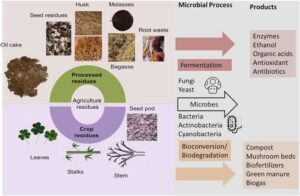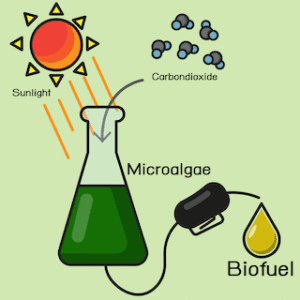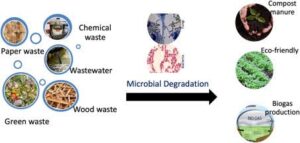Back to: MICROBIOLOGY 400 LEVEL
Welcome to class!
Hello there, my amazing friend! It’s always a pleasure to see your consistency and drive to learn. Today’s topic is one that speaks directly to both science and sustainability—Waste Management in Microbial Industries. As we produce useful products like antibiotics, enzymes, and fermented foods, we also generate waste. Managing that waste properly is essential to protect our environment, health, and communities. Let’s go through it step by step in a clear, relatable way.
Waste Management In Microbial Industries
What Is Waste Management in Microbial Industries?
Waste management refers to the collection, treatment, disposal, and safe handling of waste produced during industrial microbiological processes. In simpler terms, it’s how factories using microbes make sure they don’t pollute the land, air, or water with leftover materials.

In Nigeria, with industries like breweries, pharmaceutical plants, and food processing companies growing rapidly, waste management is not just important—it is urgent.
Types of Waste in Microbial Industries
Solid Waste
Leftover microbial cells, packaging materials, or unused raw ingredients.
Example: Yeast sludge from a brewery or leftover corn husks from fermentation processes.
Liquid Waste
Effluents (wastewater) that may contain chemicals, microbial by-products, or nutrients.
Example: Discharged water from a yoghurt factory that contains lactic acid and milk residue.
Gaseous Emissions
Gases like carbon dioxide or unpleasant odours produced during fermentation.
Why Proper Waste Management Matters
Environmental Protection: Prevents soil and water pollution.
Public Health: Reduces spread of diseases and contamination of water sources.
Compliance: Industries must follow local laws set by agencies like NESREA (National Environmental Standards and Regulations Enforcement Agency) and NAFDAC.

Reputation: Clean and well-managed facilities are trusted by consumers.
Methods of Waste Management
Physical Methods
Filtration and sedimentation are used to separate solid particles from liquid waste.
Chemical Treatment
Adding disinfectants like chlorine to kill harmful microbes before discharge.
Biological Treatment
Using bacteria or fungi to break down organic waste in treatment tanks (bioreactors).
Example: Using bacteria to treat wastewater from a cassava processing plant.
Recycling and Reuse
Some waste can be reused—like using leftover microbial biomass as animal feed or fertiliser.
Breweries may reuse yeast in multiple fermentation cycles before disposal.
Proper Disposal
Treated waste is either released safely into the environment or taken to certified waste disposal sites.

Local Challenges and Opportunities
In many parts of Nigeria, poor waste infrastructure, lack of awareness, and weak enforcement of regulations create challenges. However, smart companies are now turning waste into wealth—producing biogas, fertilisers, and even reusable water from their waste.
Summary
- Waste management is the safe handling and disposal of waste in microbial industries.
- Types of waste include solid, liquid, and gaseous by-products.
- Proper waste management protects health, the environment, and company reputation.
- Common methods include filtration, chemical treatment, biological processes, and recycling.
- In Nigeria, good waste practices are becoming more necessary and beneficial.
Evaluation
- What are two main types of waste generated in microbial industries?
- Mention two methods of managing waste.
- Why is biological treatment important in waste management?
- Name one Nigerian agency responsible for enforcing environmental regulations.
You’ve taken another powerful step towards becoming a well-rounded microbiologist. Waste management is not just science—it’s a responsibility. Keep going strong, and remember, Afrilearn is always here to guide you, every step of the way. Keep shining!
